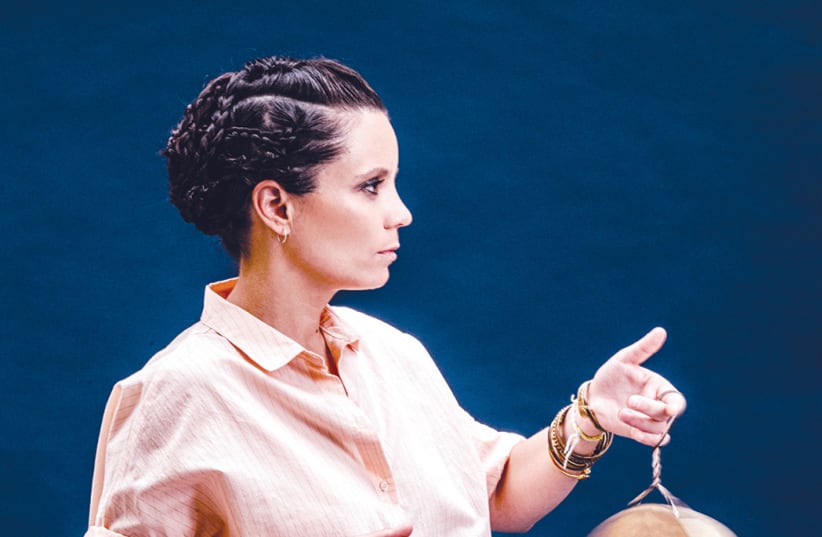Anne Paceo has come a long way since her earliest formative years in the Ivory Coast. It was there that she first absorbed, albeit probably at least a little subliminally, the beats and textures of local percussionists and drummers. “I was just a little kid then, so I don’t have any clear memories of that. But in my family they say that I play drums because of the music I heard in my childhood,” says the 38-year-old French artist. Stands to reason.
Paceo brings some of those African influences, along with her quartet, to the forthcoming Queenta Women’s Jazz Festival, the second edition of which takes place at the Yellow Submarine in Jerusalem, from May 31-June 3.
As with the inaugural bash, and as per the event’s credo, all the shows over the four days will feature women as leaders and some all-female acts, with a largely home-based lineup. The other import is American saxophonist Nicole Glover, who guests with the Queenta Ensemble, which is something of an Israeli jazz supergroup, with the likes of celebrated flutist Hadar Noiberg and pianist Katia Toobool in there.
“I think it is very important to have women jazz musicians on the stage and be seen playing the music.”
Anne Paceo
How did the Israeli jazz supergroup get its start?
Paceo’s musical road to date has taken a circuitous route across Europe, the US, Africa and Asia, with the drummer picking up sounds and rhythms everywhere she went. In fact, it is hard keeping up with her. I grabbed an all-too-brief window of opportunity to chat with her by phone as she was packing to leave for a performance in Senegal, just days before she comes to Jerusalem.
Paceo’s family returned to France when she was still an infant, but the seed of music-making had been well and truly sown during the African sojourn. And whatever she may have caught as a tiny tot was supplemented and nurtured in later years. “My mother listened to a lot of West African music,” Paceo explains. “I really loved that music and it really touched my heart.”
That, in a nutshell, is what it is all about in Paceo’s book, while keeping one’s horizons as broad and open as possible. “Music is just music,” she states, echoing something I heard from the late, great, pioneering modern jazz drummer, Max Roach, when we met in Jerusalem around 20 years ago. It’s good to hear it from the younger folk too.
“Music is just music, without boundaries, without gender,” Paceo observes. “Music has to talk to the soul. It can have different forms, different chapters. It is between art and the soul.”
The very fact that Paceo is a drummer, in itself piques the interest. The bare, troubling fact of the matter is that there are so few female jazz musicians out there strutting their stuff, and even fewer drummers. The names of Terry Lynne Carrington and Cindy Blackman, both of whom played at the Red Sea Jazz Festival in Eilat a few years back, spring to mind, but it is hard to think of too many more.
Historians may be interested to note that there was a Swing Era drummer by the name of Viola Smith, who started out in the 1920s and was reported to be still occasionally wielding her drumsticks in 2020, shortly before she eventually moved onto the celestial bandstand at the age of 107.
The matter of gender is particularly poignant in the context of the Queenta Festival. Unfortunately, sexual discrimination and domestic violence directed toward women – especially during the COVID-19 lockdowns – continue to be burning global issues.
Paceo wants to have her say, first and foremost, through her artistry. But she also wants people to accept women as a bona fide part of jazz and, in particular, to get the word out that women can drum with the best of them.
“You know our society is still patriarchal. And, to be a drummer, you don’t have to be tall and strong and full of muscles. Playing drums is not like martial arts,” she laughs. It is, she says, a matter of approaching the physical side of the role in the right way. “You learn how to play the drums naturally. You need to use your body properly, and gravity. You have to be passionate about it. Everyone can play drums.”
PERHAPS ANYONE can pick up sticks and pound away on the skins, but there are few as gifted and as multifariously channeled as Paceo, whose group in Jerusalem features a female vocalist and two male instrumentalists. Keeping her directional options open has been a feature of her career since day one.
Fueled by the rhythms and textures she heard from her neighbors back in the Ivory Coast, Paceo took the eclectic mindset a couple of stages further when she attended the jazz department of the Paris National Conservatory of Music. It was always going to be about getting her toes wet in as many cultural realms as possible.
“I played with a lot of different kinds of musicians – jazz and world music – who were open-minded. It was mostly jazz at the conservatory, but I took some ethnomusicology courses too. I took a course in Indonesian percussion, for example.”
That is reflected in her expansive oeuvre which, to date, features seven studio albums and a couple of live releases. Her road as a recording artist began more on the straight-ahead side, with trio efforts Triphase and Empreintes, which came out in 2008 and 2010 respectively. Since then, she has spiced up her cultural output considerably. The 2012 release Yokai, recorded with a French quintet, is something of a travelogue featuring music “from Rangoon to the Polar Circle by way of the Ivory Coast.”
The eclectic spread was maintained with Circles, released in 2016, in which Paceo explored pop, jazz and hip hop, along with a generous helping of groove, with her quartet at the time. She took another step outside the confines of the jazz domain with 2018 album Fables of Shwedagon, recorded live with musicians from Myanmar.
Paceo also had opportunities to learn from some of her illustrious seniors in the global jazz community, with the likes of bassists Charlie Haden and Henri Texier, saxophonist Archie Shepp, and guitarists Philippe Catherine and John McLaughlin all helping her along her formative musical way.
The Haden hook-up was a particularly momentous juncture in her developing musical consciousness. “I had a one-week masterclass with him in Paris, and he had to choose people to play on a recording with him,” Paceo recalls. The then-twentysomething drummer got the nod.
“We played the [envelope-pushing Haden ensemble] Liberation Music Orchestra’s music. It was amazing to play and be with him. After that, every time he came to Paris I spent time with him. I learned so much from him.”
Now 86, Shepp, whom I had the great pleasure and honor of hanging out with when he played at the Tel Aviv Jazz Festival in 2005, also helped shape Paceo’s approach to the craft. “That was amazing, because he helped me understand the soul of jazz music,” she enthuses. “When he played he was telling stories.” That is a spot-on description of the octogenarian reedman’s philosophy throughout his six-decade-long, and counting, career.
PACEO SAYS she is delighted to be coming to Israel and contribute to the Queenta Women’s Jazz Festival, which now forms part of a growing global roster of women-centric jazz events. One of the longest-running is the Mary Low Williams Women in Jazz Festival, held in Washington, DC since 1996; there are plenty of other jazz festivals that place women at the front of the stage, including in Stockholm, Palm Springs, Melbourne and Gdynia on Poland’s Baltic Sea coast.
The drummer says there is a message to be conveyed, besides the music.
“I think it is very important to have women jazz musicians on the stage and be seen playing the music.”
Couldn’t agree more. Let’s hope the Queenta Festival helps move things along in the desired direction and, maybe one day, it will eventually no longer be an issue.
For tickets and more information, go to yellowsubmarine.org.il/en/queenta-woman-jazz-festival













